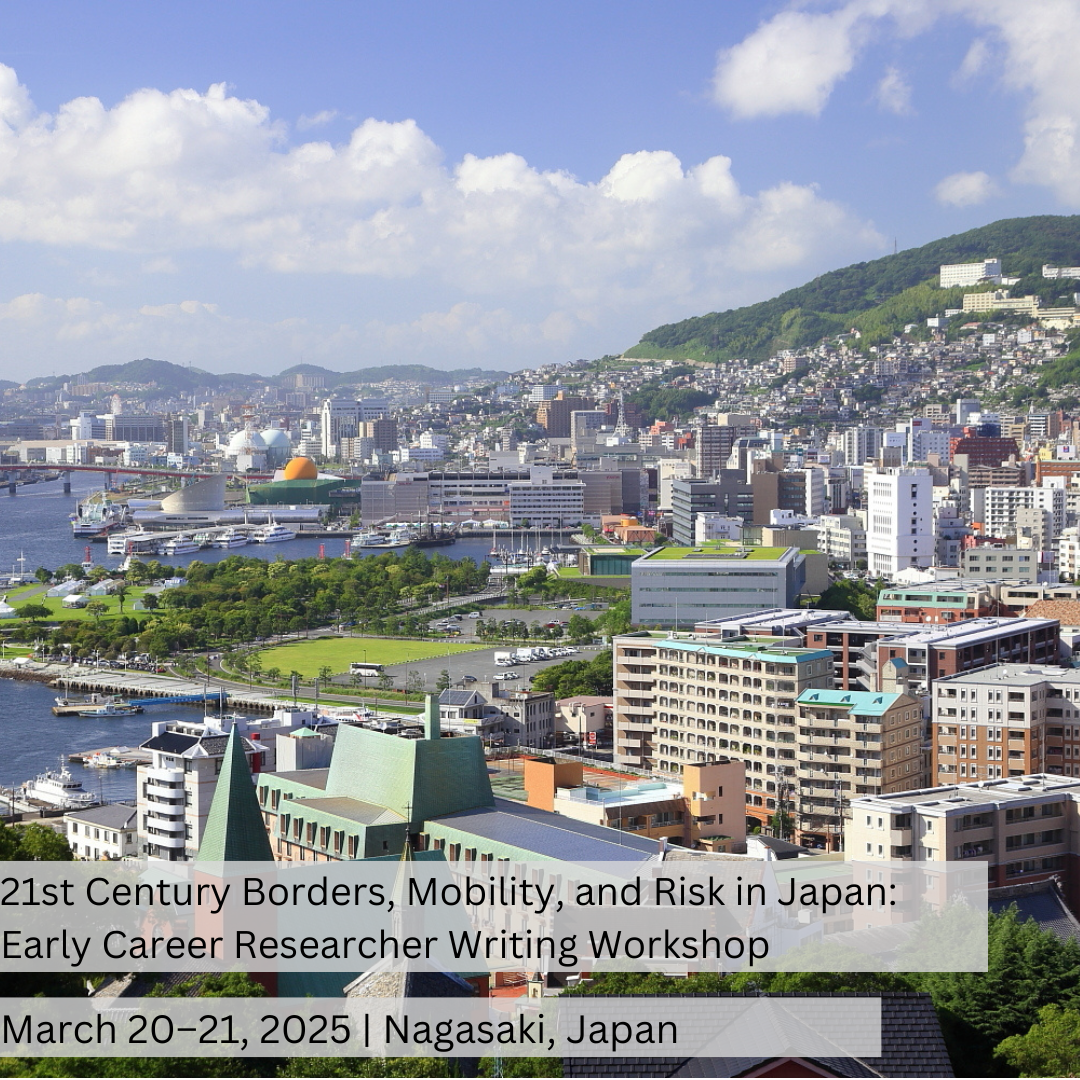Early Career Researcher Writing Workshop
March 20–21, 2025 | Nagasaki University | Nagasaki, Japan
In collaboration with the International Research Center for Japanese Studies, the Research Center for Global Risk at Nagasaki University, and the Slavic Eurasian Research Centre and School of Public Policy at Hokkaido University, this Workshop will examine the conceptualization and operation of Japan’s borders in a regional context with the aim of developing research articles and policy papers for publication.

Modern Border Management: (Im)migration and Mobility
2023 Summer Institutes, July 10-26, 2023 | Stream 2

BIG Talk: Space, Institutional innovations, and Crossborder mobility (flows)
with Dr. Sergio Peña (Colegio de la Frontera Norte, Ciudad Juárez, Mexico) | Zoom | May 17, 2023
In Person: CFGS C179 (Sedgewick) or Zoom. The meeting will take place from 10:00AM to 11:30AM PST.
Register in advance for this meeting here.
The objective of the presentation is to analyze institutional innovation related to crossborder mobility and flows. The presentation identifies different bodies of theories that have emerged in the border literatures and analyze how these theories help us understand mobility (flows) not only from the classical spatial perspective of flows of “things”, but also flows from a relational perspective. The bodies of border theory presented are: 1) the classical territoriality perspective, 2) borders in globalization, and 3) border “everywhere”. The main argument is that mobility is a policy field where institutional innovation is more likely to take place due to the convergence of interests of both sides of the border to facilitate the flows of goods and people. Also, mobility, particularly undocumented human mobility, is a very dynamic and fast changing therefore state institutions (e.g., customs and border patrol among others) must adapt their strategies. Institutional innovation is defined as the ability to “reduce distance” that would allow institutions to cooperate and collaborate to boost the development of the region. Moreover, the presentation will take a critical approach that innovation also raises ethical and moral dilemmas.
Dr. Sergio Peña holds a doctoral degree in urban and regional planning from Florida State University. He works for the Colegio de la Frontera Norte a research think tank specialized in border research and graduate education. His research agenda focused on studying crossborder planning, governance, and cooperation processes. He is the co-editor-in-chief of the Journal of Borderlands Studies. He is conducting research on crossborder mobility comparing the US -Mexico and the US- Canada.

Enhancing Labour Mobility in Alberta: The role of Immigration, Migration, and Other Factors
Richard E. Mueller | BIG Research Reports | #12

Cross-border regions as synergetic spaces: 1+1=3
Martin van der Velde
Join BIG_LAB and CFGS on Wednesday, December 10 at 10:30 am (PST) at the University of Victoria (SED C168) or online via Zoom for a Global Talk by Martin van der Velde on Cross-Border Regions as Synergetic Spaces.
Across the globe, considerable efforts are directed toward fostering cross-border integration and cooperation, grounded in the premise that “the whole exceeds the sum of its parts.” This principle is particularly evident within the European Union, which has provided financial support for cross-border region-building initiatives for over thirty-five years. Intended as seed funding to stimulate self-sustaining synergetic processes, these programs have yet to achieve their anticipated outcomes, as evidenced by the continued expansion of available funds. The principal objective of this presentation is to examine the existence of regional synergy and to try and identify the conditions for establishing synergetic spaces.
Martin van der Velde is an associate professor in the Department of Geography, Planning and Environmental Sciences at the Radboud University Nijmegen. He has extensive experience in coordinating and research in the field of borders, migration and mobility. He is interested in the effects borders do (still) have on mobility in a constantly changing process of bordering, debordering, and rebordering, not only on a (more concrete) (inter)national scale, but also in more abstract forms in societies and communities (e.g. during the so-called refugee-crisis in the EU).

with Dr. Andrew Burridge (Senior Lecturer, Macquarie University, Australia) | Zoom and University of Victoria, BC | 10:30AM PST, June 4, 2025
In Person: CFGS C168 (Sedgewick building, University of Victoria) or Zoom. The meeting will take place from 10:30am to 12pm PST. Please register here to attend this event via Zoom.
The hotel has mostly escaped the focus of those who have critically investigated spaces and practices of immigration detention and border governance. However, hotels have a long history in their use as temporary – as well as longer-term – incarceration and bordering, globally (Davidson, 2018). While hotels have been discussed within a geopolitical framing, their role in bordering practices, and specifically how they operate as carceral sites, has not yet received the necessary attention required to understand their continued use for this purpose. As Mountz et al. (2013: 523) argue, “detention systems do not operate in isolation, but rather are intensified by the growth of related global industries and policies that become enmeshed in distinct geopolitical landscapes.”
Following in the footsteps of the ‘hotel geopolitics’ agenda developed by Fregonese and Ramadan (2015), Andrew illustrates how hotels become integrated into border regimes. In doing so, he contributes to debates on the material and infrastructural dimensions of bordering practices and specifically to the literature on carceral geographies, polymorphic bordering and the politics of mobility.
Andrew Burridge is a political geographer, based in the Discipline of Geography and Planning, School of Communications, Society and Culture, at Macquarie University, in Sydney, Australia. Andrew’s work has focused primarily upon undocumented migration, the effects of border securitization and immigration detention, as well as asylum and refugee reception and settlement. He has worked with several immigrant and refugee rights organizations including No More Deaths/No Más Muertes (US), Bristol Refugee Rights and Right to Remain (UK), and the International Detention Coalition. He is co-editor of the collection Beyond Walls and Cages: Prisons, Borders and Global Crisis (UGA Press, 2012).

Academic Partner – Kyoto, Japan
International Research Center for Japanese Studies
The International Research Center for Japanese Studies, or Nichibunken (日文研), is an inter-university research institute in Kyoto. Along with the National Institute of Japanese Literature, the National Museum of Japanese History, and the National Museum of Ethnology, it is one of the National Institutes for the Humanities. The center is devoted to research related to Japanese culture.
IRJCS’s work with BIG Lab
The 21st Century Borders in Japan – Early Career Researcher Writing Workshop was held at Hokkaido University in February 2024. This brought together eight young researchers (two faculty members, one post-doctoral researcher, three doctoral students, and two master’s students) involved in research on Japan’s borders. It was preceded by a talk by Professor Emmanuel Brunet-Jailly, who explained the goals of the “Borders in Globalization” project.
The workshop itself was held over two days, February 15-16, and was a great success. The small number of participants allowed for a free exchange of ideas and a productive and cooperative atmosphere. The purpose of the workshop was to foster papers submitted in advance by eight participants. Each paper received detailed feedback from one Workshop peer and workshop conveners, Prof. Emmanuel Brunet-Jailly, Prof. Naomi Chi (Hokkaido University), and Edward Boyle (IRCJS).
More recently, the “21st Century Borders, Mobility, and Risk in Japan” Workshop was held in Nagasaki, hosted by Naomi Chi (Hokkaido University), Tian Yunchen (IRCJS), and Edward Boyle (IRCJS).

Junior Resident Fellow
Onome Akhigbe
Onome is a Master’s in Public Administration (MPA) student from Nigeria, who came to Canada in 2022. She works as a research assistant with the Borders in Globalization (BIG) lab at the University of Victoria. In her role, she focuses on developing case studies on cross-border mobility and researching cross-border infrastructure across different continents. Through her work, Onome contributes to the understanding of global cross-border dynamics and collaborates with colleagues to explore various aspects of international movement and infrastructure.

#30 & 31 BIG Podcast – Democracy, Migration Studies, and Border Studies: Bridges and/or Gaps
featuring Oliver Schmidtke, UVic European Studies Scholar, Professor, and Director of the Centre for Global Studies
Classically, Migration Studies explore all mobility regimes of human groups. There is a spectrum of public policies ranging from the migration of high-skilled workers to refugees. For the Migration Studies, national borders provide a form of social closure. Traditionally, Borders refer to issues that are fundamental to political community (state sovereignty, territorial delimitation, national security, political identity). And for this reason, borders are also instruments for regulating flows, policy tool for inclusion/exclusion. Several authors have pointed out a form of gap between Border Studies and Migration Studies. That there was a lack of cross-fertilization between these two research traditions. And some populist and nationalist discourses can exploit the ambivalence of the borders and the confusion around it. In this episode, Oliver Schmidtke joins BIG_Lab to discuss all the relations between democracy, migration, and borders and get answers to some important questions.
Listen to Part One: Apple Podcasts, Spotify, and YouTube.
Listen to Part Two: Apple Podcasts, Spotify, and YouTube.
Oliver Schmidtke is a Professor in the Departments of Political Science and History at the University of Victoria where he also holds the Jean Monnet Chair in European History and Politics. He received his PhD from the European University Institute (EUI) in Florence. He taught at the Humboldt University Berlin before joining UVic in 2000 and has been a visiting scholar at Harvard University, Bonn University, the European University Institute, and Hamburg University.

